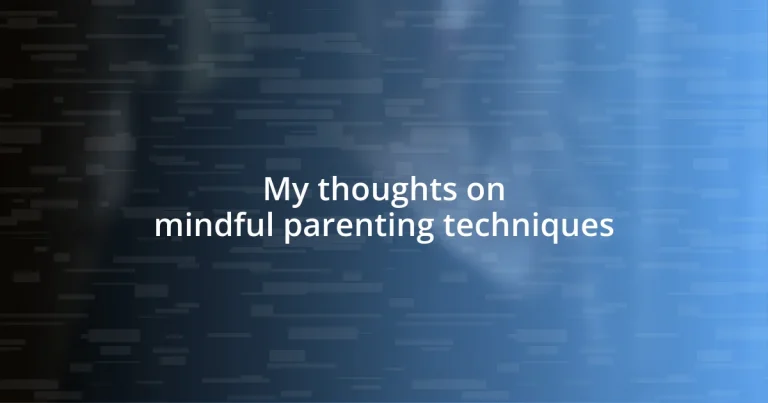Key takeaways:
- Mindful parenting fosters deeper emotional connections and improves emotional regulation for both parents and children, leading to a more nurturing family environment.
- Practical techniques such as mindful breathing, active listening, and gratitude journaling enhance presence and communication in parenting, transforming daily interactions into meaningful experiences.
- By embracing mindfulness during challenging moments, parents can respond with compassion, creating resilience and encouraging emotional awareness in their children.
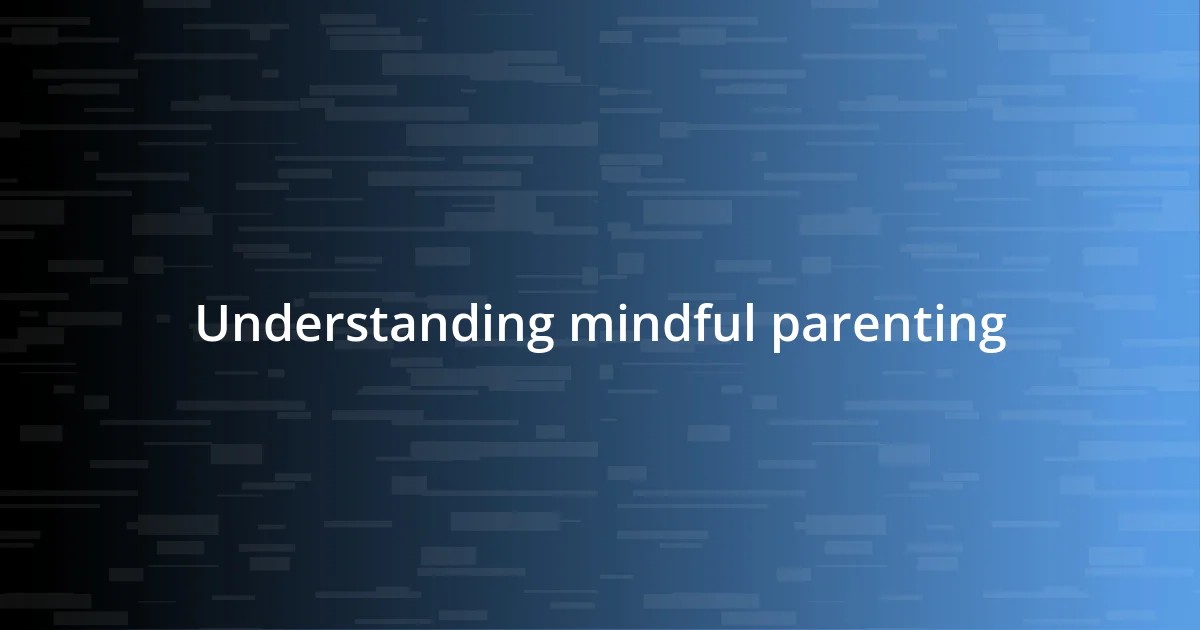
Understanding mindful parenting
Mindful parenting is all about being present in the moment with your children, allowing you to truly connect with them. I remember a day when my child was playing quietly, and instead of checking my phone, I sat down beside them. The joy on their face as we built a fort together was a reminder of how these little moments matter.
This approach encourages us to respond to our children’s needs with empathy rather than react out of frustration. Have you ever felt that tight knot of irritation when your child is having a meltdown in a public place? I certainly have. But through mindful parenting, I’ve learned to take a deep breath, pause, and approach the situation with understanding, which ultimately diffuses tension and fosters a deeper bond.
At its core, mindful parenting invites us to reflect on our own emotions and triggers. I found that by being aware of my feelings, I could better model emotional regulation for my kids. How powerful is that? It transforms the parenting experience into a journey of growth for both parents and children, creating a nurturing environment where everyone can thrive.
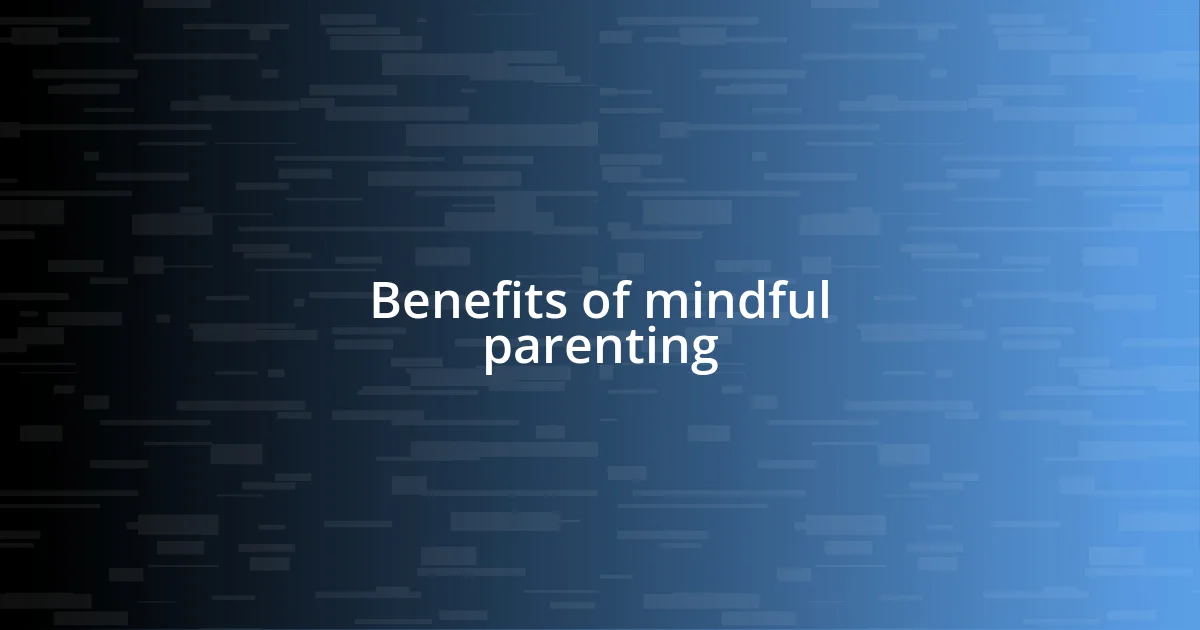
Benefits of mindful parenting
The benefits of mindful parenting are truly transformative, not just for kids but for parents too. I recall days where stress and overwhelm often clouded my parenting. However, by embracing mindfulness, I started to feel lighter and more connected. My relationship with my child improved as I became more attuned to their emotions and needs, which allowed me to respond with patience and compassion instead of frustration.
Here are some specific benefits of mindful parenting:
- Enhanced Emotional Connection: Mindfulness allows you to be present, promoting deeper bonds with your children.
- Improved Emotional Regulation: By modeling calmness, children learn to manage their own emotions effectively.
- Healthier Stress Management: Practicing mindfulness helps reduce stress levels, making you a more relaxed and available parent.
- Greater Awareness of Parenting Triggers: You can identify and mitigate personal triggers that lead to reactive behaviors, fostering a healthier family dynamic.
- Increased Patience and Empathy: You’ll find yourself responding with more understanding, creating a nurturing atmosphere for your child to grow.
I often find that simply taking a moment to breathe deeply before responding to my child’s requests shifts my mindset, allowing me to be more patient. This mindfulness practice has not only affected our interactions but has also made me more attuned to my own well-being, which is just as critical in the chaotic world of parenting.
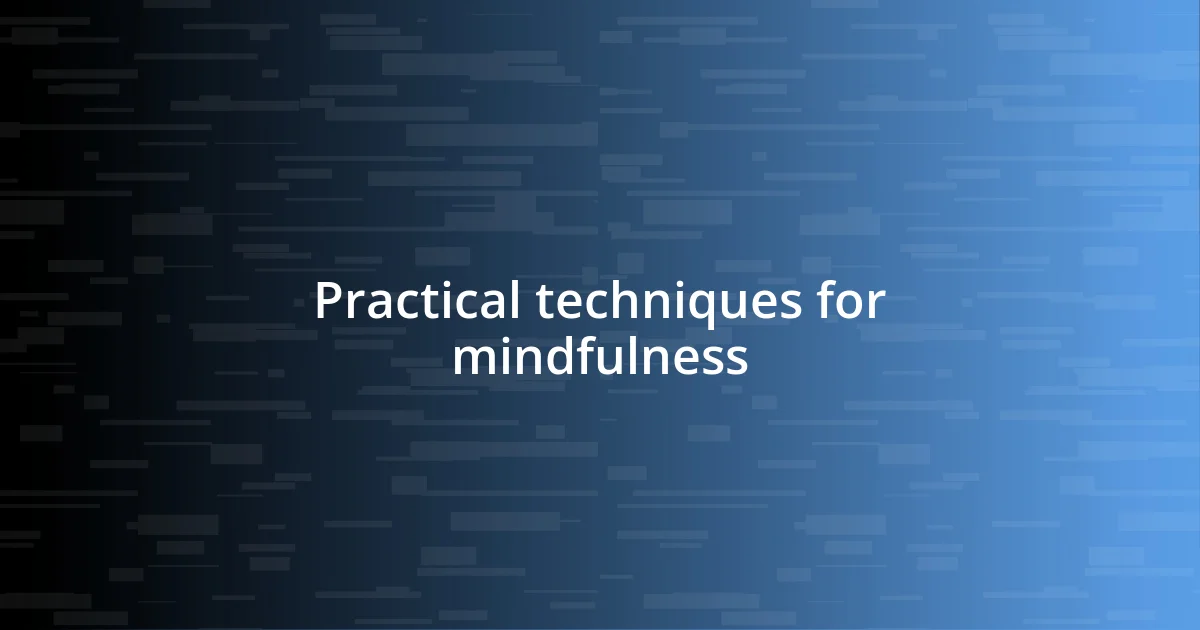
Practical techniques for mindfulness
| Technique | Description |
|---|---|
| Mindful Breathing | Incorporate deep breathing exercises for a few minutes each day, allowing yourself to center before engaging with your kids. It not only calms your mind but also helps you be present when responding to their needs. |
| Active Listening | Practice truly listening to your child’s thoughts and feelings without interruption. I discovered that pausing to fully understand my child made our conversations more meaningful. |
| Gratitude Journaling | Keep a daily journal where you jot down moments of joy or things you’re thankful for in your parenting journey. This simple act shifts my perspective and helps me focus on the positive aspects of familial interactions. |
One effective technique I’ve embraced is mindful breathing, a simple yet powerful tool. When I feel my patience thinning, I take a moment to breathe deeply. It’s remarkable how a few slow breaths can shift my mindset, making me more receptive when my child shares their feelings, whether it’s about a tough day or their latest fascination.
Active listening has truly transformed my interactions. I remember a time when my child wanted to share a story about their day at school. Instead of multitasking, I made sure to lock eyes and give them my undivided attention. The sheer delight on their face when I validated their feelings was a beautiful reminder of how we connect on a deeper level when we truly listen.
Another technique I’ve found valuable is gratitude journaling. At the end of each day, I write down one thing that brought me joy in my parenting journey. Reflecting on these moments encourages me to appreciate the little things, like a spontaneous dance party in the living room or a quiet snuggle before bedtime. It helps me approach the next day with a positive outlook, reminding me of the importance of presence in each cherished moment.
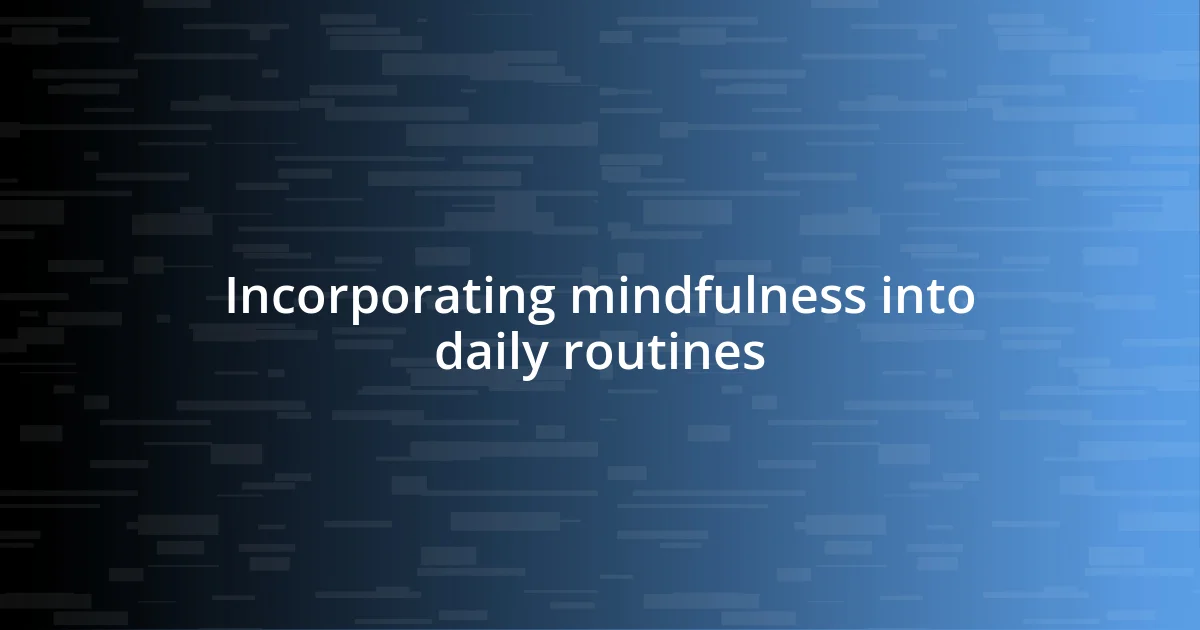
Incorporating mindfulness into daily routines
Incorporating mindfulness into our daily routines has become essential for me. I recall one particularly hectic morning where everything felt chaotic. Before rushing out, I took a moment to sit quietly, tuning into my breath and setting an intention for the day. That brief pause shifted not just my mindset, but also affected how I interacted with my kids, turning what could have been a stressful morning into a beautiful, shared experience of laughter and connection.
Have you ever noticed how easy it is to get lost in daily distractions? I try to weave mindfulness into activities like cooking or even folding laundry. When I’m in the kitchen, I focus on the textures, colors, and smells of the ingredients. This simple act transforms routine chores into moments of presence, allowing me to feel more grounded and connected to my family, especially when I invite my child to “help” me with cooking. Not only does it foster a fun environment, but it also reinforces the importance of being in the moment together.
Even moments set aside for transitions—like getting in the car or waiting for bedtime—can become opportunities for mindfulness. I often turn these transitional times into mini-mindfulness moments. For instance, during our nightly routine, I make it a practice to share three things we loved about our day. This not only nurtures gratitude but strengthens our emotional connection. It allows us to reflect together, ensuring we close the day on a note of appreciation rather than stress. Transforming simple rituals into mindful practices feels like a gift we give ourselves and our children. Isn’t it fascinating how small shifts can spark such profound changes in our lives?
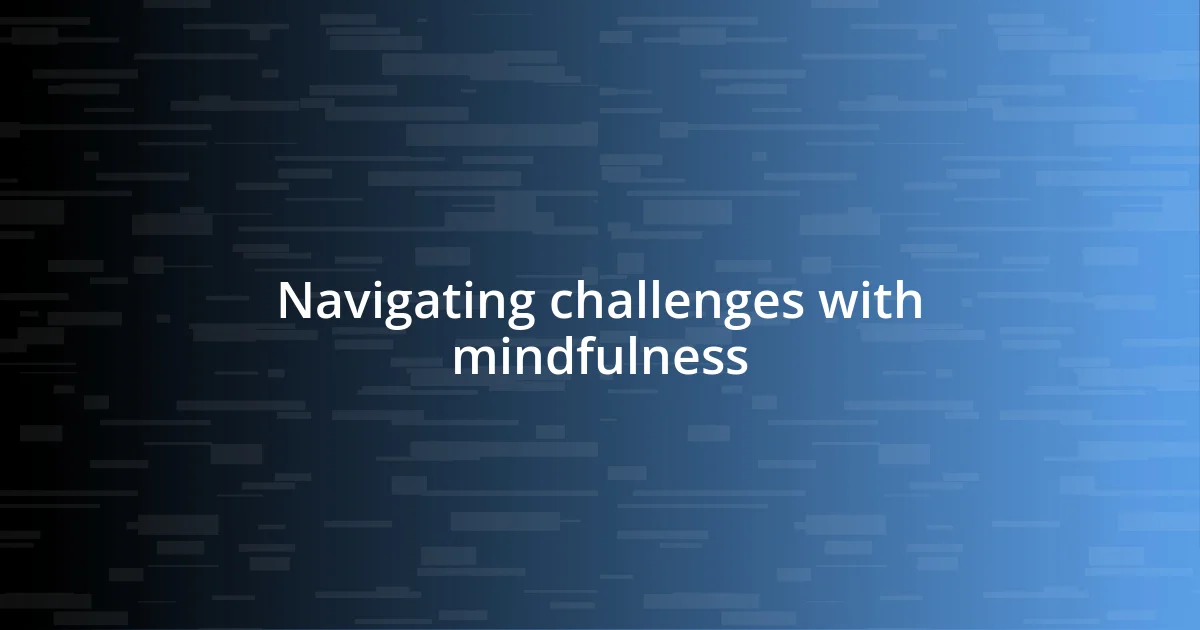
Navigating challenges with mindfulness
Navigating challenges with mindfulness can be transformative, especially during trying moments. I recall a time when my child threw a tantrum at the grocery store, and I could feel my heart racing. Instead of reacting immediately, I paused and took a deep breath, grounding myself in the present. This single act of mindfulness helped me respond with compassion rather than frustration, effectively calming the situation and allowing us to leave the store with a sense of teamwork rather than chaos.
There are moments when parenting feels overwhelming, right? I’ve found that practicing acceptance—acknowledging my emotions without judgment—helps me navigate these challenges. For example, after a particularly long day, I felt a wave of frustration wash over me when my child refused to go to bed. Instead of lashing out, I simply named the feeling: “I’m feeling overwhelmed right now.” This acknowledgment created space for me to connect with my child on a deeper level, reminding us both that it’s okay to experience tough emotions.
Mindfulness is not just a technique but a way of building resilience as a parent. One evening, we faced the usual homework battle, and it was chaotic. Rather than getting caught up in frustration, I suggested we tackle it together, treating it like an adventure. By focusing on the process rather than the outcome, we turned what could have been a negative experience into a collaborative journey. It made me realize that using mindfulness to navigate challenges isn’t about avoiding discomfort but embracing it and working through it together as a family. How do you handle those overwhelming moments in your parenting journey?
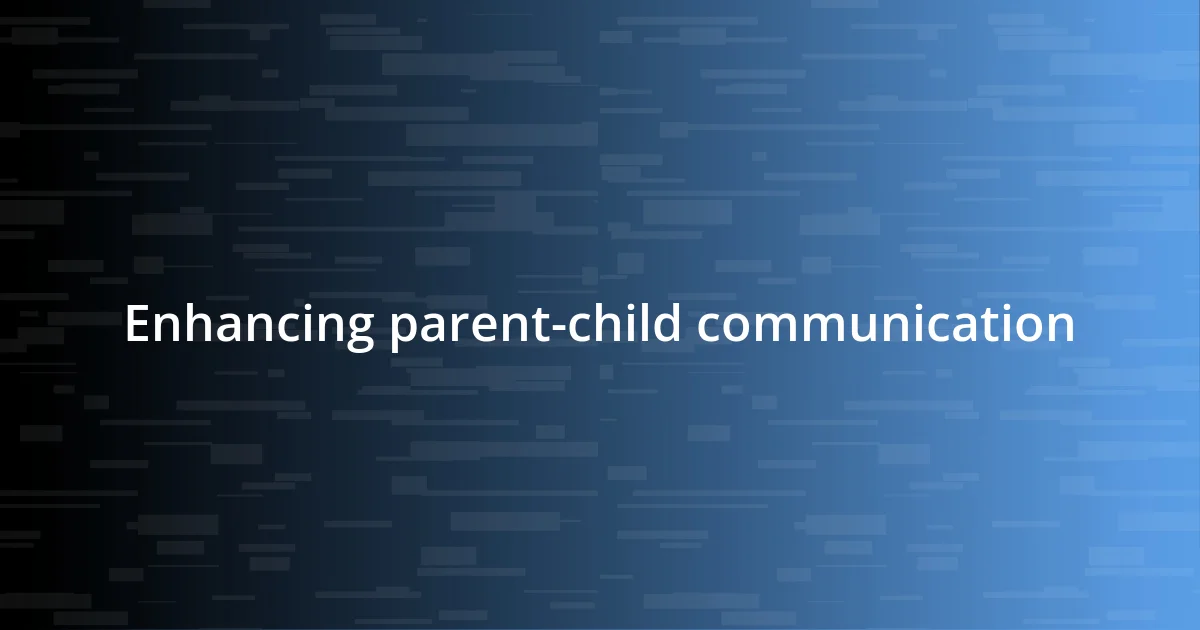
Enhancing parent-child communication
Enhancing parent-child communication is something I believe requires ongoing effort and awareness. One evening, my daughter was upset after a tough day at school. Instead of launching into problem-solving mode, I asked her open-ended questions about her feelings. Creating that safe space for her to express herself made all the difference. Have you ever noticed how just listening can bridge gaps that words sometimes fail to cross?
When I prioritize active listening, I find that my children feel more valued and understood. For instance, during car rides, I often use the time to chat without distractions. I make it a point to put my phone away and tune into their stories, no matter how trivial they might seem. It’s in these unguarded, candid moments that we truly connect, and I cherish the conversations that stem from this focused attention.
I’ve realized that non-verbal communication plays a significant role too. Just last week, my son seemed a little withdrawn after school. Instead of directly asking him about it, I sat down beside him, maintaining eye contact, and simply offered my presence. I could feel the weight lift as he opened up about his day. Isn’t it powerful how sometimes, silence speaks louder than words? Being attuned to those moments can lead to deeper connections and understanding.
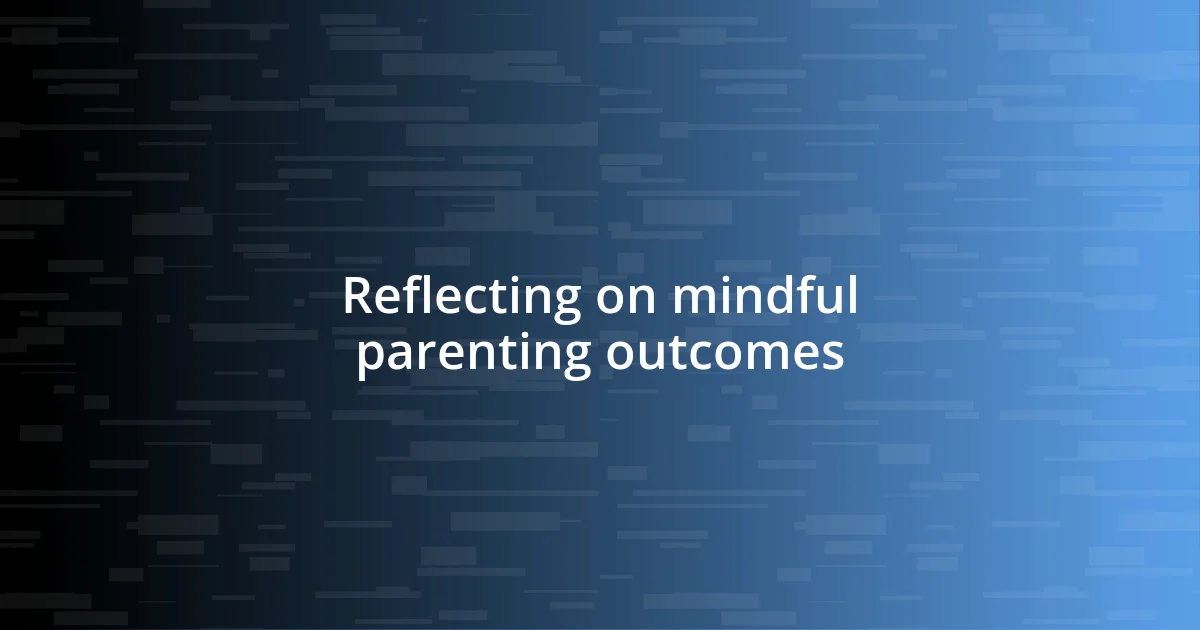
Reflecting on mindful parenting outcomes
Reflecting on mindful parenting outcomes reveals a rich tapestry of emotional and relational growth. I remember a picnic we had where, instead of insisting on a strict schedule, I let the kids dictate the flow. We ended up lying on the grass, pointing out shapes in the clouds, which deepened our connection and filled the air with laughter—something I realized is often lost in the hustle of daily routines. Have you ever experienced a moment that made you realize just how responsive your children can be when you tune into their needs?
The outcomes of practicing mindfulness in parenting become evident over time. For example, I’ve observed that after embracing mindfulness techniques, my children have started to reflect that calmness in their reactions. Recently, during a frustrating board game night, my younger child paused before responding to a setback. She took a breath and smiled instead of sulking. Watching her navigate that moment reinforced my belief that mindful parenting can cultivate emotional awareness and resilience in our kids. Isn’t it incredible how our behaviors can inspire them to adopt similar approaches?
On a more personal note, I’ve noticed that my own well-being has improved since I began this mindful journey. There was a period when I was overwhelmed, feeling like I was just trying to survive rather than enjoy parenting. However, once I decided to embrace mindfulness, I found myself savoring the moments—like bedtime stories or laughing at silly jokes. This shift not only enhanced my parenting but also filled my life with more joy and presence. Have you thought about how your own practices influence your family’s emotional landscape?












